Maine Outdoor School for All
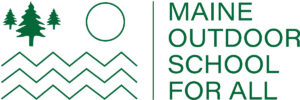 Dear Chewonki community, I would like to encourage you to learn more about the Act to Support Outdoor School for All Maine Students. This legislation, which was recently been introduced to the Maine State Legislature, aims to provide immersive outdoor education experiences for publicly funded students in grades 4 through 8 in schools across Maine.
Dear Chewonki community, I would like to encourage you to learn more about the Act to Support Outdoor School for All Maine Students. This legislation, which was recently been introduced to the Maine State Legislature, aims to provide immersive outdoor education experiences for publicly funded students in grades 4 through 8 in schools across Maine.
This bill will partner school districts with overnight outdoor education organizations such as Chewonki Outdoor Classroom to provide every student in the 4th, 5th, 6th, 7th, or 8th grade an opportunity to attend a two-night, three-day outdoor school program. The Act to Support Outdoor School for All Maine Students recognizes the importance of providing students with opportunities to build self-sufficiency and leadership skills, understand and value Maine’s outdoor heritage, and the interdependence of Maine’s rural and urban areas. Outdoor school experiences develop critical thinking skills and improve academic performance, school attendance, and post-graduate success. However, less than a quarter of Maine students are currently able to attend outdoor school programming, with rural and lower-income districts facing particular challenges in accessing these experiences.
Maine Outdoor School for All (MOSFA) is a network we are collaborating with to advocate for this bill. For MOSFA to be able to provide the programming to make this happen, we need to pass the legislation, and for that, we need your advocacy. As someone who cares about the education and well-being of Maine students, I am asking for your support in promoting this bill within your network. Please consider taking the following actions:
- Reach out to your Maine state representatives to urge them to support this bill
- Use content from this email and the attached two-pager to aid your process of sharing information about this bill
- Talk about this bill with members of your community, encouraging business leaders, teachers, and parents to also spread the word about this bill
- Write and/or present testimony once the hearing regarding this bill is scheduled
- Write op-eds/letters to the editor in your local newspapers in support of this bill
- Attend information sessions as they are offered
- Send questions about the bill and how to get involved to coordinator@mosfa.org
Thank you for your time and consideration. Together, we can provide all Maine students with the opportunity to benefit from outdoor school education.
Best regards,
Nancy Kennedy
Acting President
Chewonki Schools Phased Reopening Plan
To the Chewonki community,
I write today to share information about our return to in-person learning in September 2020. This letter does not contain all the details of the plan, but it offers a summary that will be elaborated on in program and staff-specific communications. At all times, we need to be aware that conditions could change and cause elements of this plan to change as well.
Since March 13 our campus has been devoid of in-person learning while we have prioritized the health and safety of our community. Although our educators have been heroic in their remote learning design and delivery through the school year and summer, we are all eager to return to safe and meaningful in-person learning on Chewonki Neck.
In recent months we have learned more about Covid-19 and the strategies to minimize its transmission. The State of Maine has implemented careful and sustained efforts to limit cases, which has been especially successful in Lincoln and neighboring Sagadahoc counties where there has been no community spread to date.
Meanwhile, at Chewonki we have been deep in learning, researching, and planning for reopening. In early June we hired a consulting group to conduct a thorough, multi-phase Health and Wellness Assessment of Chewonki. We also created an internal Covid-19 Coordination Center with seven staff working groups to study and outline reopening criteria and needs.
Our plan principles include:
- Prioritize student, staff, and community health and wellness.
- Maximize the quality and substance of the educational experiences of participants.
- Safeguard the long-term strength of Chewonki and its financial resources.
- Balance the best of what we know with the willingness to Integrate new, innovative thinking into our planning and programs.
The plan and the summary here were only possible due to the work of our Covid-19 Coordination Center team and working group leaders who have been focused, dedicated, and always willing to learn through this uncertain time.
Our Context for Reopening
We are mindful that we continue to live with a novel infectious disease (Covid-19) that does not have a definitive treatment or vaccine, and which is spreading rapidly around the world. The number one concern must be the health and safety of our community members.
However, Maine has a low-density population and thus far a low Covid-19 caseload (see New York Times data). Also as of today, Lincoln County, where Chewonki is located, had not yet experienced confirmed community spread of Covid-19 among the 31 total cases recorded.
The Federal CDC, State of Maine, State of Maine CDC, and the State of Maine Department of Education (DOE) have each published increasingly detailed and helpful guidance for education institutions to reopen to in person learning. Maine DOE has emphasized local control over reopening decisions in its guidance document.
In April 2020, we established organizational safety criteria for a return to in-person programming, which have been updated this summer to include the following.
- Widespread access to Covid-19 testing, contact tracing, isolation strategies, and treatments.
- Our ability to comply with state and federal guidelines for accepted practices that reduce the risk of transmission within a school community.
- Acceptable capacity within Chewonki and local medical resources to respond to medical incidents, including Covid-19 cases.
- Approval by Chewonki’s medical and legal counsel and insurance agent.
It is in this context, with official guidance, that we have created the following phased reopening plan with associated health and safety protocols.
Summary of Phased Return to In-Person Programming
Our programming will resume in phases based upon official guidance, our four plan principles, and our revised safety criteria as cited above, as well as the individual decisions of our family and school partners. At all times, we will track pandemic conditions that could impact this timeline.
Fall 2020
-
- Maine Coast Semester at Chewonki will welcome students to campus on September 5th for a term that concludes on December 5th (without breaks).
- Chewonki Elementary and Middle School students will begin their school year on September 8th.
- Camp Chewonki will begin no-commitment Save My Space reservations on August 15 for Summer ‘21.
- Traveling Natural History Programs have been redesigned for online delivery and will continue in that format until schools welcome guest instructors and it is safe to regularly convene community gatherings across the state.
- Chewonki will collaborate with RSU1 officials to determine when to return to in-person learning with Waypoint students.
Anticipated 2021
-
- Maine Coast Semester will begin the spring semester on February 13th and conclude on May 15th (without breaks).
- Outdoor Classroom will begin a gradual reopening for school groups as early as April 2021.
- Camp Chewonki will resume in-person programming in early summer 2021.
This plan could adjust at any time due to changes in any of the factors cited at the start of this section. In particular, community spread of Covid-19 in our local area or on campus could significantly impact plans, programs, and operations.
Strategies to Mitigate Covid-19 Risk at Chewonki
We are implementing an array of Covid-19 transmission mitigation strategies and tactics to support in-person learning this fall.
Health Screening
-
- Maine Coast Semester students will
- Self-quarantine 14 days prior to arrival
- Test for Covid-19 prior to arrival
- Test for Covid-19 after arrival
- Limit close contact to cabin groups for the first 7 days
- Complete daily health screening for symptoms
- Continue testing and isolation as needed
- Elementary and Middle School students and faculty will
- Complete daily health screening for symptoms
- Test, quarantine, and isolate at home as needed
- Commuting and other support staff and residents will
- Complete daily health screening for symptoms
- Test, quarantine, and isolate at home as needed
- Restrict movement on campus to designated areas
- Maine Coast Semester students will
Micro-communities
-
- Chewonki will use the household or “cohort” (small group) concept to inform lower-risk programming. For example, Maine Coast Semester will begin the semester with outdoor programming by cabin families only.
- Maine Coast Semester and Elementary and Middle School will use separate buildings and maintain tightly restricted communities to limit intersecting on campus.
- All administrative staff that can work remotely will do so through at least summer 2021.
- One administrative building, the Farmhouse, will be restricted to non-program staff who need to access on-campus resources during the academic year.
- Special efforts will be made to foster the community values of our mission for both work-away and on-site staff.
- Elementary Middle School class groups will avoid intersection and have designated indoor, outdoor, and bathroom spaces.
- Maine Coast Semester students will not have a break or family weekend, or allow visitors to campus during their semester.
- Off-campus trips for Maine Coast Semester students will be limited to prioritized learning experiences, e.g. science field labs, etc.
- Elementary Middle School class groups will not leave campus on field trips until further notice.
Standard precautions
-
- Learning and activity will take place outside whenever possible.
- Face coverings will be worn in shared indoor spaces, and outdoors as required by the activity to maintain health and safety.
- Handwashing and hand sanitizer stations will be prevalent across campus.
- Physical distancing will be observed.
- Plexiglass barriers will be added as needed.
- Natural ventilation of buildings will be used whenever possible.
- Mechanical ventilation will be improved for classrooms, offices, and residential spaces.
- Accommodations will be made for staff and students with pre-existing conditions.
- Classrooms are being outfitted with additional technology to allow for simultaneous in-person and remote learning.
- Physical spaces are being reconfigured for physical distancing.
- Additional handwashing sinks are being added.
- Increasing frequency and standard of cleaning indoor spaces.
Behavior
-
- Hygiene and physical distancing and other expectations for students, families, faculty and staff will be communicated clearly.
- All faculty, staff, students, and families will be trained in safety protocols.
- We will revisit expectations and protocols with faculty, staff, and students regularly.
- Health and safety signage will be posted throughout campus.
- Updates will be readily available online for faculty, staff, students, and families.
Campus Health Services
Because medical and epidemiological considerations are the priority for reopening of in-person programming, we are prioritizing improvements in health services, which include:
- A two-phase Health and Wellness Assessment conducted by an outside consulting team.
- Phase 1: focused advice for staffing and facility in the Covid-19 context
- Phase 2: comprehensive recommendations for health and wellness program, protocols, staffing, and facility for all of Chewonki (due by end of 2020)
- We are hiring additional clinical and administrative staff to provide care and support for students, families, faculty, and staff, as well as increased mental health care services.
- Renovations to our existing Health Center and additional isolation facilities will be ready for reopening in September.
- A longer-term project is now underway to build a new permanent, comprehensive health and wellness center designed to meet year-round needs, including our largest participant and staff populations.
Hybrid Instruction Preparedness
Although our plan is to return to in-person programming in September, there are many reasons why we need to be prepared for a hybrid scenario (in-person and remote learning) for the coming school year. If we encounter individual Covid-19 cases, or if the local community experiences an outbreak, we may need to deploy remote learning in part or in full at different times. Decisions about instruction may differ between our boarding and day school communities. To be prepared for hybrid instruction, we are taking the following steps:
- Upgrading laptops as needed for all faculty, staff, and students
- Upgrading our campus network and WiFi infrastructure as needed
- Improving all classroom instructional technology
- Beginning faculty preparation earlier than normal in August
- Strengthening the staff technology integration team to support all faculty and staff
- Increasing support and guidance for online software use by all faculty and staff
- Developing new platforms and work processes to support online and remote learning
- Providing professional development as needed for our faculty and staff
Diversity, Equity, and Inclusion Considerations
Throughout our research and collaboration, staff have been asking equity-based questions to inform reopening plans. Examples of work underway for equity include:
- An 18-month collaboration with an outside consulting team to support our organizational development with a Diversity, Equity, and Inclusion (DEI) lens
- Increased financial aid to support all enrolled students to attend regardless of changing circumstances during the pandemic
- Developing an alumni of color mentor group to support students of color attending Maine Coast Semester
- A pre-arrival orientation program to support the social-emotional health and inclusion of Maine Coast Semester students as they return to school after five and a half months of pandemic living
- Supporting staff and student affinity groups
- Increased health services resources for physical and social-emotional health needs of all students
- A one-to-one laptop program in place for all Maine Coast Semester and Middle School students
- Significant pre-arrival orientation by phone and online to support all students and families with readiness to succeed in a new and adapted learning environment
Frequently Asked Questions
Please visit the Covid-19 information page of the Chewonki website for continuous updates to frequently asked questions.
Will learning at Chewonki really be the same?
The short answer is “yes and no.” The “magic” of Chewonki is in small groups of young people learning safely together in community and nature, guided by expert, caring adults. We are confident that will be happening on Chewonki Neck this fall based upon the plans outlined here. That said, those small groups will be called upon to think even more strategically about community health and safety, face coverings and other precautions will be ubiquitous, and the scope of activities (such as off-campus travel) will be responsive to external conditions. Furthermore, the calendar, schedules, and curriculum are being modified to facilitate health and safety.
We are very optimistic about what is planned and we expect that some of the innovations from this time will be retained even after the pandemic when we see the advantages over past practice.
What is the Financial Outlook for Chewonki?
Before the pandemic hit, we had been on a growth trajectory and 2019 was our most successful year ever in terms of fundraising and annual financial results. However, the pandemic is causing a financial strain for Chewonki like none experienced in our 105-year history. We currently project a net tuition loss of more than $3 million between April 2020 and August 2021 (compared to annual operating expenses of approximately $7.5 million).
We will weather this storm and emerge stronger on the other side thanks to a remarkable faculty and staff, committed Trustees, wise advisors, and generous donors. In April we received a significant forgivable loan as part of the CARES Act Paycheck Protection Program, and more recently we received a Small Business Association Emergency Injury Disaster Loan for Covid-19 expenses. We have also secured an increase in available credit from Bath Savings Institution, our long-time community banking partner. Generous donor support with unrestricted giving has also helped build the financial bridge through this time.
That said, we have implemented conservative spending protocols where we can. Program closures have resulted in lower seasonal staffing and we have shared the burden pain among faculty and staff, including a temporary graduated salary reduction for those earning over $50,000 per year, and temporary reduction in hours for some positions.
The painful irony of this challenge is that operating in a pandemic takes more time, effort, and expertise than usual. We need professionals to adapt and be resilient. We also need to spend more than before in areas such as facility modifications, health services, information technology, and cleaning services (this is not a complete list). There are no easy or short-term solutions for what may be our most significant operating deficits ever.
Staff and Trustees together have developed a multi-year financing plan based upon phased reopening, use of credit, cost containment, philanthropy, and the resilience of our assets, including our endowment, to ensure Chewonki remains successful and strong through the pandemic.
Are Parents or Visitors allowed on Campus?
For the safety of the community, we are heavily restricting access to the campus by parents and visitors while programs are in session. Program-specific details will be available soon on our Covid-19 status pages.
What will happen if someone at Chewonki becomes ill with Covid-19?
We are currently developing three protocols that will be shared with all families before the start of fall programming:
- A student, faculty, or staff member is a suspected Covid-19 case
- A student, faculty, or staff member is a confirmed Covid-19 case
- There is widespread transmission of Covid-19 in the surrounding region
In all instances, our priorities are to protect the health & well-being of the individual involved, prevent any spread of Covid-19, and quickly inform all members of the community. Thank you for your patience on receiving this guidance, the level of detail is substantial.
Flexibility and Uncertainty
Over the past four months we have been forced to become more comfortable with uncertainty, new information and adaptation. Even as we share this plan, it is important to remember that it is subject to changing circumstances and new information.
For example, if local hospital capacity to treat Covid-19 is overwhelmed, or if a new government mandate were put in place, we may have to change our plans and that could impact our ability to offer in-person learning on campus, perhaps requiring us to pivot to distance learning.
However, we believe that both now and on the other side of the Covid-19 pandemic outdoor and place-based learning will be more important than ever. We are eager for the time when children are back on Chewonki Neck with caring, expert adults, learning together about how to shape our shared future for the better. This is why the effort to reopen safely is so important to us.
Questions and Keeping in Touch
We expect that many in our community and micro-communities will have questions about our plans. The contents of this email, as well as program-specific details are available on our Chewonki Covid-19 Status page. That page will be updated regularly with any changes to our Covid-related policies or procedures. In addition, families enrolled in an active program can expect to receive regular email updates.
Live Online Q&A Sessions:
We are holding a series of Zoom “town hall” meetings in late July and August.
- Chewonki Faculty & Staff: Each Monday and Wednesday
- Chewonki Board & Trustees: July 24, 2020
- Maine Coast Semester: The week of August 3-7, 2020 (multiple)
- Chewonki Elementary and Middle School: August 10 & 12, 2020
The times and instructions for joining these sessions will be sent separately to each group.
Finally, thank you for your patience and understanding as we have worked together to solve novel problems while looking out for each other. I am immensely proud of our staff and faculty who continue to meet the demands of Covid-19. Our shared effort to provide life-changing learning in nature for young people is worth all this effort, and much more.
Sincerely,
Willard Morgan
President
An Anti-Racism Message to the Chewonki Community
The death of George Floyd under the knee of a white police officer, recorded for nearly nine horrifying minutes, opened a floodgate of pain for so many over the past week. The outrage grows inside each of us as this sickening event builds on so many others to further expose racism in our society and in ourselves.
We are speaking up today, as white leaders of a predominantly white institution, in solidarity with black and indigenous communities, as well as other communities of color, to join the growing chorus saying “black lives matter,” and to do our part to stop systemic discrimination and persecution of marginalized communities in the United States.
We write to mourn the killing of George Floyd, Ahmaud Arbery, and Breonna Taylor, along with the painfully long list of other terrorized victims – and pledge to work with those in our community striving for a more equitable, just, and safe country. These tragic and needless deaths have added injury atop the painful reminder of systemic racism and inequities in our country highlighted by the disproportionate impacts of the COVID-19 pandemic on people of color.
Breaking the “white silence” about race is important for us as individuals and for Chewonki as an institution. We acknowledge the uncomfortable dualism of decrying the wrongs of the system while also recognizing the ways it has benefitted us as individuals. Leaning into that discomfort, we need to send a message befitting our roles as teachers, mentors, leaders, and role models to the thousands of students, campers, and adults in our community who are watching what we say and do…and also what we fail to say, and fail to do. We join with our alumni and friends who have reached out to us, who are speaking up, and who are leading the way in their communities.
During a listening session yesterday, one Chewonki staff member insightfully commented that “transformative growth,” a pillar of our mission, requires acknowledging, examining, and letting go of past behaviors, habits, and beliefs; it means a change in culture for the individual and the group. We cannot possibly build “thriving, sustainable communities” when so many of us are denied safety, dignity, and equitable treatment under the law.
For us and Chewonki that means persistent learning, educating, and training about race, bias, and systemic racism for participants, staff, and board. It means actively adjusting systems, structures, and policies to increase equity, address areas of growth, and expand the spaces in our culture for those who were not historically at the center of Chewonki.
The white members of our community must do this work together, no matter how hard it is. And to the black members of our community, the indigenous members of our community, and the other people of color in our community, we strive to be accountable to you and support anti-racism work in our world, our schools, our organization, our policies, and our hearts.
Below we have included select resources geared towards white community members to inform learning, parenting, and leading. They are sourced from our diversity, equity, and inclusion (DEI) task force members, peer institution leaders, and respected DEI practitioners.
We are broken-hearted, like many of you, feeling the pain of these times. We stand, speak, and act together. Onward.
Sincerely,
Willard Morgan
President
Roseanne Saalfield
Chair, Board of Trustees
Selected resources:
- The National Association for the Education of Young Children, Equity Resources: An extensive list of resources for teaching for equity with young children.
- Anti-Racism Resources for White People: A compilation of resources for white people and parents to deepen their anti-racism knowledge and work.
- 75 Things White People Can Do for Racial Justice: Curated by Medium and updated regularly.
Teaching about Race, Racism, and Policy Violence: A resource from Teaching Tolerance for educators to address subjects in the classroom.
Our 2019 Annual Report
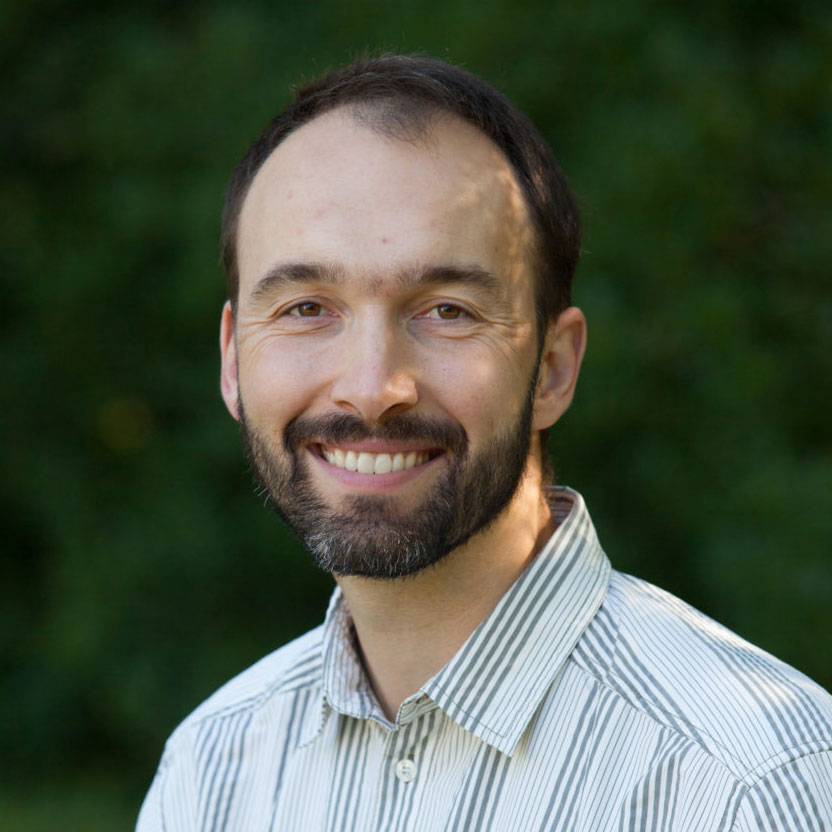
 Willard Morgan
President
Willard Morgan
President
5 Principles of Place-Based Learning You Can Use With Your Child
On the first day of COVID-19-induced home-schooling, one Chewonki alumni family with three children under 10 asked me by telephone, “Can Chewonki help me out with some curriculum?” I was happy to say we were already working on it for our students, but I had to be honest and say that it would take us a bit of time to help our alumni in a substantial way. Like everyone right now, we are adjusting to a new normal.
As we all transition to distance learning, I offer you five principles of place-based learning to get your home-based education program up and running.
1. Set a Daily Schedule & Stick to it
I have often seen people mistakenly implement progressive education approaches without structure, expectations, and accountability. Children feel safe and perform better with a regular schedule. Make the schedule with them if they are old enough, include some big blocks of time, and allow for plenty of physical activity and creative time.
2. Be Physically Active Throughout the Day
Research proves that in addition to all the other health and mental health benefits, regular aerobic activity increases learning efficiency and retention, also known as “stickiness.” Start the day with a burst of activity, even with a “morning mile” if you are able to, and then have regular activity blocks throughout the day. The learning will follow, even if you have less “seat time.”
3. Use Neighborhood Resources for Learning
Social distancing practices may mean that indoor cultural resources are not available in these times, however, everyone has unique resources within a short distance of your home. Local nature, whether an urban park or rural wild area, provides limitless potential for observation, study, and inspiration. At Chewonki we often use “sit spots” for “phenology,” the study of seasonal natural phenomena over time. Meanwhile, the built environment has tremendous potential for the same approaches – observation, study, and inspiration, from creative writing to art.
4. Make Household Chores Part of the Education
Having children at home for an extended time is going to be a lot of work for parents and extended family. Now is the time to reset expectations for what children do and to make that part of their education. Work alongside your children to make meals, wash dishes, do the laundry, and complete other chores. And consider how to go one step farther: Integrate math instruction with baking for younger students, teach science by cooking for older students, and explore the history of changing home technologies and household roles over time as you run your household together. These are just a few examples of the learning all around you.
5. Connect (Remotely) Socially Every Day
As our social spheres shrink in a time of restrictions on movement and gathering, it is important to maintain positive connections, even if virtually. Resurrect the old art of letter-writing. Set up a regular conference or video call with a group of friends or family. Or choose one extended family member or old family friend to call each day to reconnect with. Everyone will benefit and I bet you might wonder why you haven’t been doing that more often.
These are just a few principles to consider as you set up a new normal for learning in your household. There is important coursework from school to focus on and learning targets to work towards, however, without a clear structure, regular physical activity, and social connections, the academic work will be a challenge to complete.
Teaching and learning at home needs to feel real and relevant for students if they are to find joy and self-motivation. So include household chores and your neighborhood resources in the process and I suspect you will be surprised by the outcomes.
Willard Morgan is the President of Chewonki, a non-profit organization in Wiscasset, Maine, dedicated to inspiring transformative growth, teaching appreciation and stewardship of the natural world, and challenging people to build thriving, sustainable communities throughout their lives.
Learning to See
Seventh-graders from Camden Rockport Middle School in Camden, Maine, were poking around Chewonki recently, notebooks in hand. What was most noticeable about them was how intently they were looking. They quietly scrutinized the farm animals, the November forest, and the shoreline.

Camden Rockport Middle School is among the schools with whom Chewonki Outdoor Classroom works, explains Outdoor Classroom Co-coordinator Katie Yakubowski, and these students were involved in “a very cool project-based learning exercise called ‘Learning How to See.’ It incorporates science, specifically focusing on observation skills and symbiotic relationships; art; and language arts.”
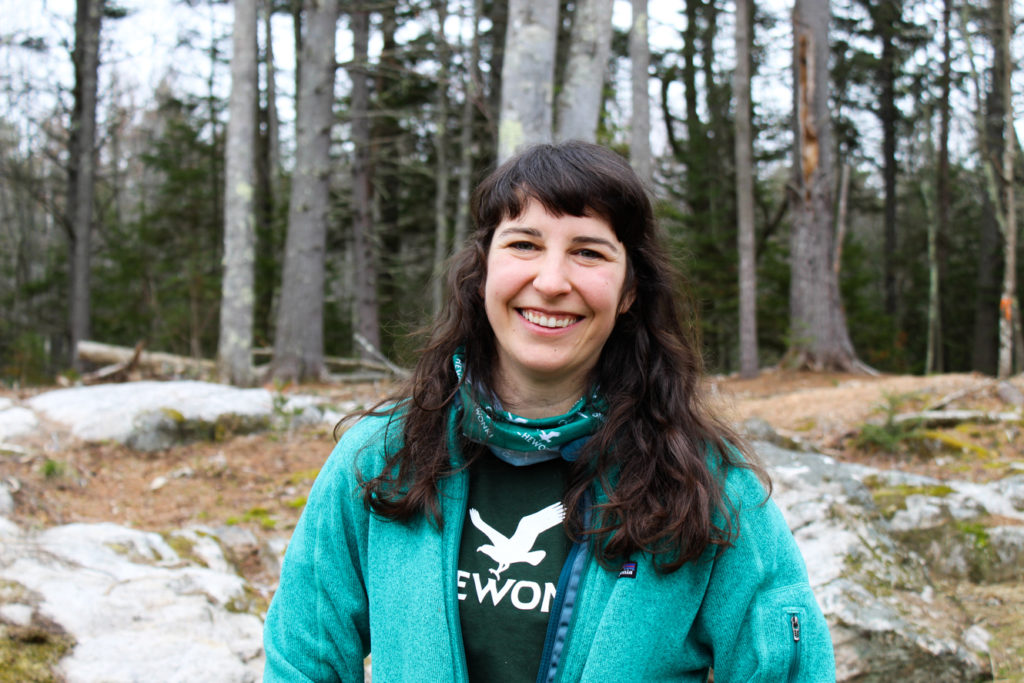
Nine groups totaling 95 Camden Rockport students came to Chewonki for a three-day, two-night Outdoor Classroom encampment “to learn about different ecosystems and practice making in-depth observations of nature,” says Yakubowski “They did careful observations around their campsites and also did an Estuary Study, a Farm Study, and either chores or a work project. They also went on the Challenge Course [ropes, wires, and high and low elements] to do some group initiatives in the woods.”
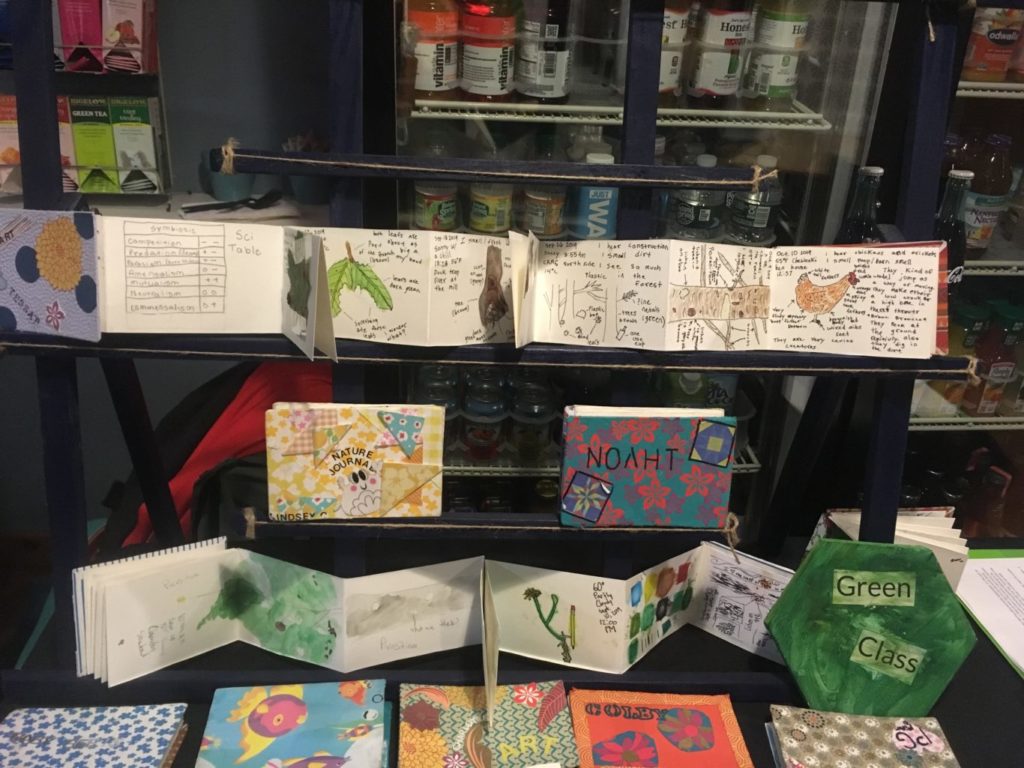
The students recorded their findings through scientific documentation, artistic expression, research, and creative writing in journals. Back at their school after their visit to Chewonki, the students exhibited their “nature journals,” each a unique work of art, for the school community to enjoy.
Student Veronica Waters explained that project-based learning: “Students engage in real-world problems or challenges which they can explore through multiple perspectives. As a result, you can get lots of different right answers.” The question that prompted the students’ scientific inquiry and creative expression, she said, was: “How is life interconnected and interdependent?”
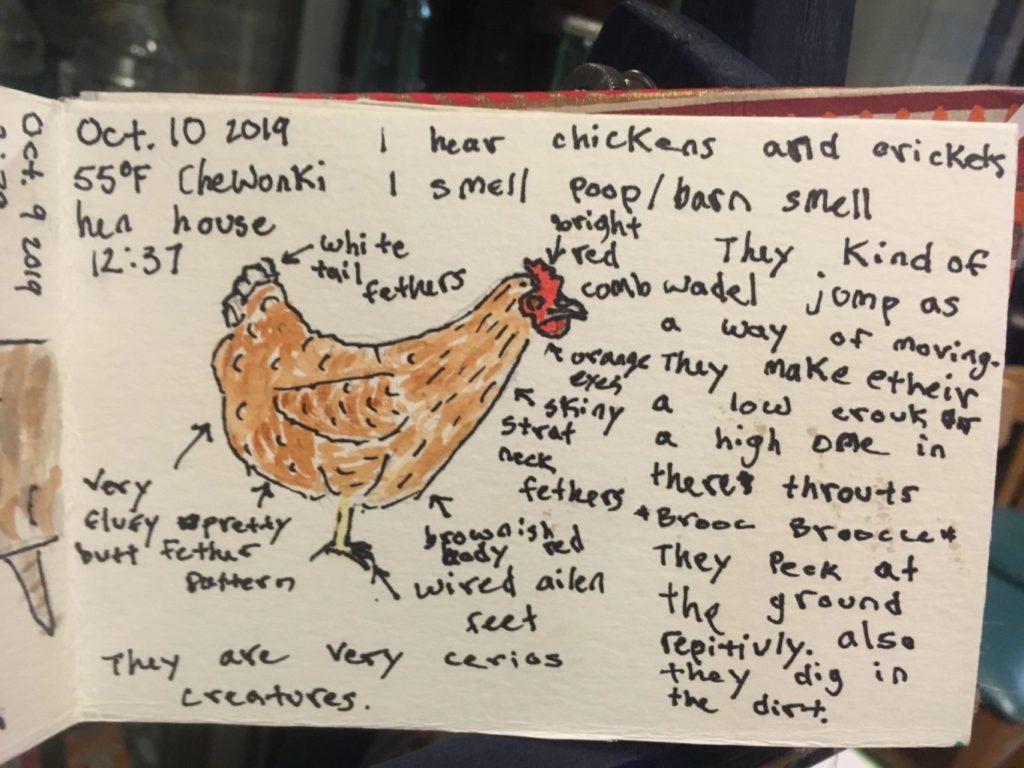
Yakubowski describes the venture as a great example of the imaginative ways that the Outdoor Classroom and schools can partner to strengthen learning through nature-based experiences that support academic goals and emotional growth. The Outdoor Classroom staff was as excited as the students about the visit, she says. “The theme of symbiosis was great, and our educators really enjoyed this program because the kids were so well versed in taking observations and the chaperones were completely committed–our activities tied directly to their school project.”
Charlotte Denehy, a seventh-grader at Camden Rockport Middle School, wrote a poem after her visit to Chewonki. Here is an excerpt:
Dear Mother Earth,
I appreciate you.
Your pleasant and unpleasant places included.
You provide me with so much.
Knowledge, home, beautiful memories…
But most of all, you give me joy.
Joy through learning.
Learning through smelling the pine trees on Chewonki farm, through feeling the wind in the crisp fall air…
Learning through sitting in the tall grass while listening to the chickens, through hearing the crickets’ patterned noises…
You bring me joy by guiding my thoughts when I’m lost.
But you also let me find my own way back.
And sometimes, you let me escape reality for a few moments.
Like the moments I spent enjoying the Perch.*
Far up in the strong trees of the Chewonki woods.
It was quiet and peaceful there…
A pleasant place. A place to appreciate…
I appreciate you, Mother Earth.
And all you’ve done for me.
*Editor’s note: The Perch is a wooden platform suspended in a cluster of trees on Chewonki Neck.
Onion Foundation Supports Citizen Science at Chewonki with $15,000 Grant
Wiscasset, Maine. The Onion Foundation has awarded Chewonki a $15,000 grant to support an initiative to integrate citizen science into place-based science education at Chewonki and in nearby public schools.
“We are very grateful to the Onion Foundation for this great opportunity to link Chewonki educators, local teachers, and students in field-based research,” says Keith Crowley, director of education partnerships at Chewonki. “Citizen science as a framework for high-quality education offers many benefits. This project will increase students’ and teachers’ sense of place and cultivate recognition that field research is an essential piece of environmental knowledge.”
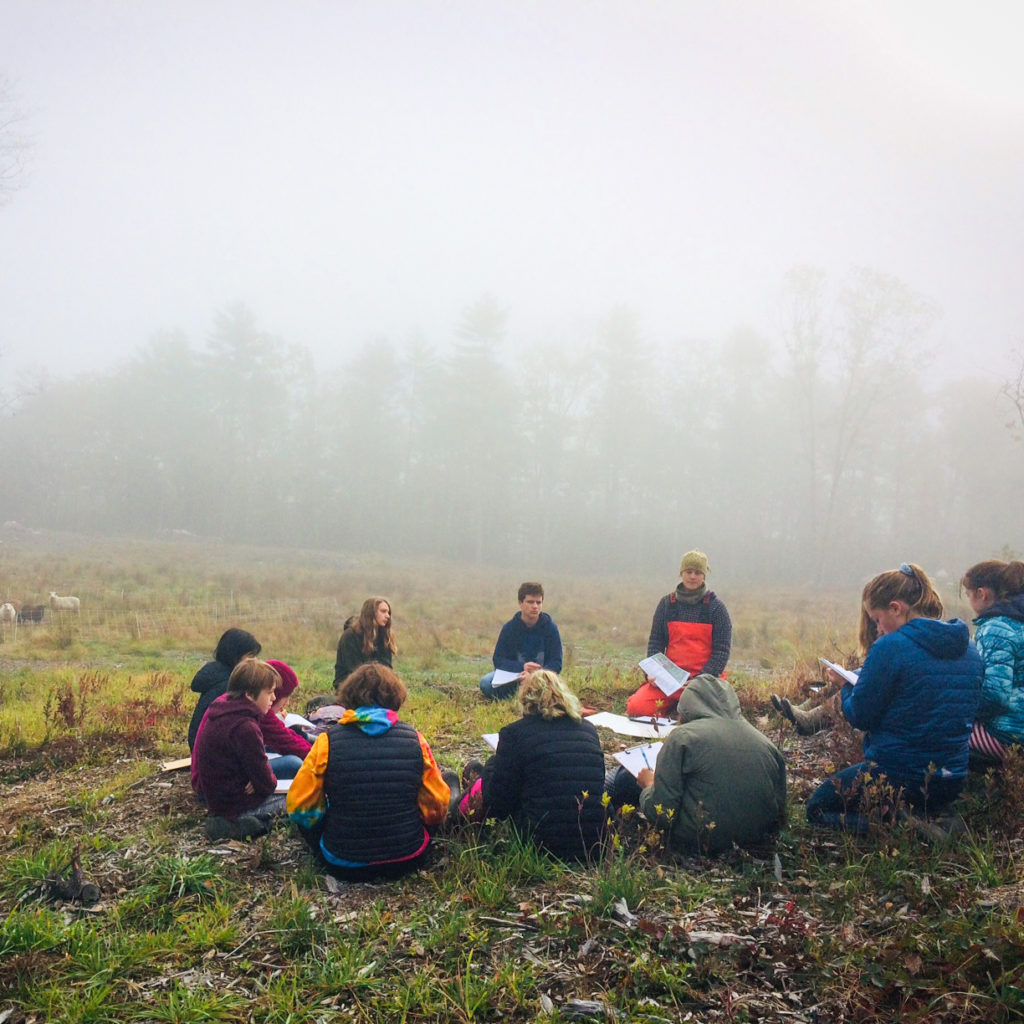
With the grant, Chewonki educators and science teachers from Regional School Unit 1 (Bath and surrounding towns) and the Wiscasset School Department will collaborate in creating an ongoing, place-based, citizen research project to engage students in real science and the local ecosystem.
Chewonki is planning to bring its own science teachers together with those from neighboring public schools to choose a data-driven research project. The project will require students and teachers to immerse themselves in the ecological community around them and engage in authentic research that could be useful to more comprehensive, professional, scientific research.
Potential areas of focus include monitoring migratory bird patterns, exploring the impact of microplastics in the marine environment, and aquaculture activities in local habitats.
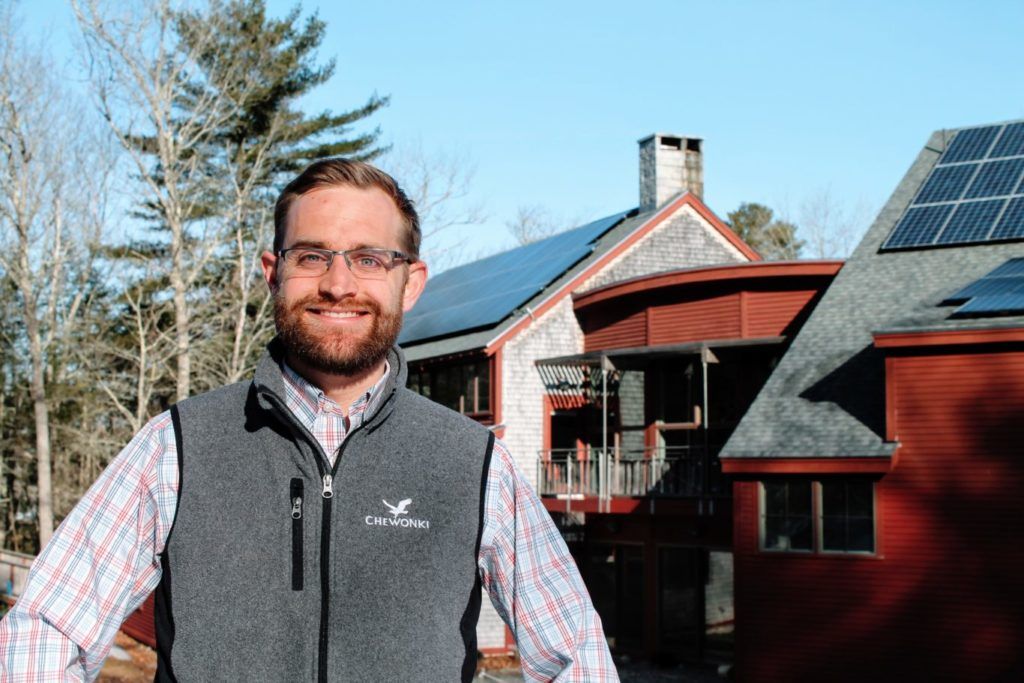
“This work will highlight local ecological features and demonstrate connections between what students discover around them and global environmental issues,” Crowley says. He hopes middle and high school science teachers will integrate the project work directly into their curricula.
The Onion Foundation is a private philanthropic foundation based in Auburn, Maine. The foundation’s mission is “To encourage conservation and stewardship of the natural environment and promote music and the arts in the state of Maine.” Learn more about the Onion Foundation at: https://www.onionfoundation.org/
An Open Letter to the Chewonki Community
This weekend the Portland Press Herald published an article featuring an open letter by former Chewonki staff sharing concerns about our facilitation of issues and conversations related to diversity, equity, and inclusion.
I want you to hear about this issue directly from me so I can share a few thoughts on the subject. While I feel the newspaper article does not tell the complete story, I agree that Chewonki needs to evolve as an institution. It is for that reason we began a series of professional development trainings, engaged in community dialogue, and ultimately wrote, approved, and published our diversity, equity, and inclusion (DEI*) statement in November 2018.
Our DEI statement describes the scope of work and the principles needed to shape Chewonki into a more diverse, equitable, and inclusive institution. By design, this work is a process, not a project with a fixed endpoint. Our DEI statement intentionally describes a future that we have not yet reached.
In the months since we published our DEI statement, we shared this work with our community and began implementing it in programs and operations. A task force, comprised of board and staff members, has been gathering input from every department, including outside experts, to discern key priorities to inform our next projects. We have made progress in several areas, and there is much more work yet to do–work that I welcome.
I am proud of the work our staff is doing, the direction our board has provided, and the ongoing support from Chewonki alumni. I hope you will join us in this important effort and that you will be in touch if you want to share your comments or concerns with me.
Sincerely,

Willard Morgan
President
* You can read our full DEI statement and a supporting document here.
All the Points!
As we roll into September, Chewonki is feeling the full shift in the seasons: dry air, cool nights, and the return of our Outdoor Classroom programs.
This week, we have a “full house” on Chewonki Neck with more than 150 students attending from four schools, Applewild School, Friends Academy, The Pennfield School, and Providence Country Day School. Welcome!
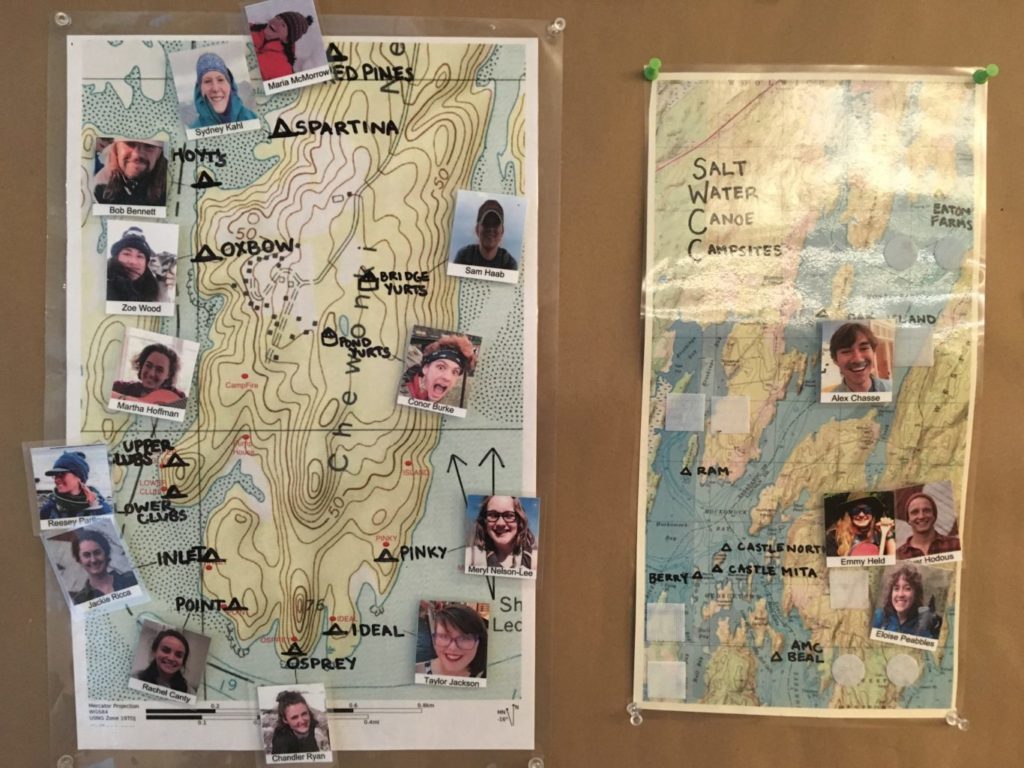
Students and chaperones will be using every inch of Chewonki Neck, as well as our island campsites. While they are here, students will learn canoeing and camping skills, expore different biomes, and take part in a variety of ecology, natural history, and science lessons (including our new Starlab).


